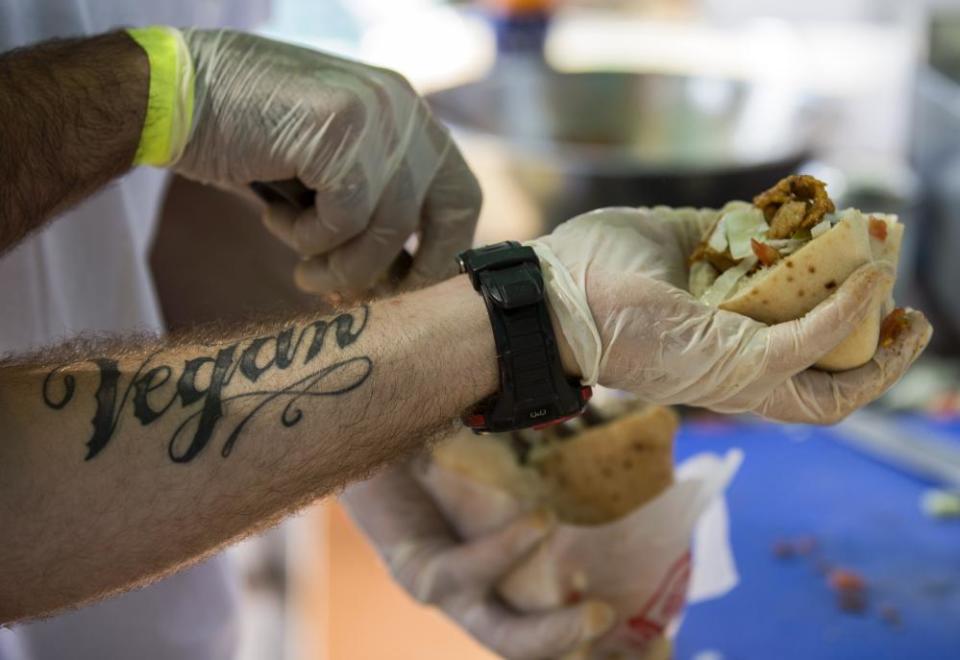'There is no kosher meat': the Israelis full of zeal for going vegan

There’s a wildcard option that some Israeli Jews have started using when they can’t find a restaurant with a kosher certificate: vegan food.
Fresh fruits, vegetables and grains are, by most accounts, naturally kosher and as the mixing of dairy and meat is forbidden in Judaism, a safe choice is to eat somewhere that avoids both.
A growing religious zeal for veganism has been further fostered by rabbis who question whether the faithful should eat animals at all, especially under modern farming methods considered inhumane. Animal abuse is explicitly forbidden in the Bible.
“The world has changed. We don’t have a choice. We must become vegan,” says religious scholar, Asa Keisar, a figurehead of the campaign for Jewish veganism. “There is no kosher meat at all.”
Israel’s vegan movement has found that alongside its mostly secular, progressive base, members from more pious sections of society are also joining its ranks, and making the country one of the easiest places to be vegan.

In September, more than 70 rabbis from around the world signed a declaration urging Jews to choose veganism, saying it was a contradiction to claim that products made “through a process that involves inordinate cruelty and barbarity toward animal life can truly be considered kosher in our world”.
“The garden of Eden, which was the ideal society, was a vegetarian society. Adam and Eve were vegans,” Rabbi David Rosen, former chief rabbi of Ireland, said in the statement.
From a tiny faction of outliers just five years ago, Israeli vegans now say they make up 5% of the country’s population, a higher percentage than anywhere else in the world.
An estimated 500 restaurants are vegan or have substantial plant-based dishes on their menus. Tel Aviv is often referred to as the world’s “vegan capital” while Domino’s’ Israel branch was the first to sell animal-product-free pizza. Most coffee chains have vegan options.
“Veganism is almost mainstream,” said Ori Shavit, a consultant for Israeli restaurants hoping to cater for the growing camp.
Ideas spread fast in a country of 8 million. Judaism has helped too, she says, because the kosher diet means Jews, even many secular ones, have a culture of checking what is in their food.
“Even if I’m not keeping kosher, I know what it means, and I know how to keep kosher. We are used to looking at the label; we’re used to separating dairy from meat,” she said. “It’s the idea of not eating automatically. This is something that is very helpful when you come to embrace the vegan diet.”
Religious sections of society, even if they aren’t vegan, provide a vast market for businesses selling vegan products. For example, when eating a burger it would not be kosher to drink a glass of milk, so many Israelis buy alternatives.
These types of non-dairy, non-meat foods are labelled as “parve” and are well-stocked. Even small corner shops sell cartons of almond and rice milk. Parve products are mostly vegan, although sometimes they include eggs.
“The consumer audience is actually very big because it touches almost every family. That can encourage veganism. It makes veganism easier, so it’s a win-win situation,” said Shavit.
Practising Jews are becoming increasingly aware of veganism, Shavit says. She recently ran a pop-up restaurant that had no official kosher certificate but would often see Jews wearing skullcaps – usually signifying that they’re Orthodox – eating there.
Keisar wants to see more people becoming vegan for religious reasons. He has lectured in synagogues around the country and hung posters promoting veganism in ultra-Orthodox neighbourhoods.
He argues that Jewish teaching imposed so many onerous rules on meat consumption because the intent is to stop the practice altogether.
“The Torah, the Bible, does not want people to eat meat ... we have maybe a thousand rules about meat in Judaism,” he said.
Jewish law provides detailed instructions on how animals should be kept and slaughtered, down to the precise motion of the knife during the killing. It’s forbidden to slaughter an animal in front of another, such as is practice in many poultry farms. Consuming blood is prohibited. And certain parts of animals are not kosher, including parts of the fat and the sciatic nerve. Many Jews won’t eat a sirloin steak because of its proximity to that nerve.
When you cannot keep these rules, and Keisar says nobody can, you have one option left: veganism.

 Yahoo News
Yahoo News 
